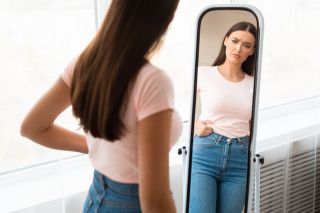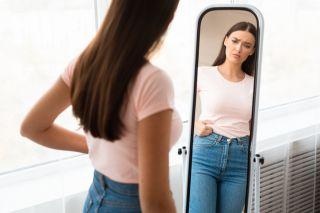KEY POINTS-
- Mirrors are a complex tool when it comes to eating disorders and body image.
- Most people assume avoiding mirrors is harmless, but research suggests that sometimes the opposite is true.
- Excessive body checking or scrutiny can be a precursor to eating disorders.
- Regular exposure to mirrors can help with eating disorder recovery and anxiety.
This article was written by Gia Marson, Ed.D.
"Smile in the mirror. Do that every morning, and you'll start to see a big difference in your life." ― Yoko Ono
To most of us, mirrors are unobtrusive functional objects we come into contact with every day but don’t give much thought to—much like a bedside table or a faucet. But mirrors play a far more complex role in the lives of those with eating disorders, eating disorder behaviors, anxiety, or body dissatisfaction.

Recent research suggests that disturbances in how we see ourselves can play a central role in the development and maintenance of eating disorders. When people with eating disorders look in the mirror, they often fixate on and scrutinize separate body parts rather than seeing themselves as a whole. They also experience heightened levels of anxiety as a result.
Studies also suggest that individuals with eating disorders focus more on their perceived negative features and tend to ignore positive aspects. This is also a symptom of body dysmorphic disorder (BDD), which is an extreme concern with physical appearance. In one study, nearly half of all participants with eating disorders showed high levels of body distortion.
Given what we know about the association among emotion, body image, and eating disorders, it may come as no surprise that viewing one’s physical self while experiencing a negative emotion can be detrimental. One study of women with bulimia nervosa asked participants to look at their bodies in a full-length mirror while being exposed to either happy or sad film clips. Participants who watched the happy clip experienced a significant decrease in body dissatisfaction, while those exposed to the sad clip spent more time focusing on their most disliked body parts.
The good news is that emotion may hold potential as a tool to reduce body dissatisfaction. Strategies that help us to be in a positive mood—such as meditation, exercise, and close relationships, among others—may offer opportunities to decrease negative thoughts about our bodies.
Mirror avoidance
So if mirrors can make us feel worse about our bodies, shouldn’t we avoid them? This is a common question that has sparked a practice called mirror avoidance. This happens when people refrain from looking in the mirror for a specific period of time, with the belief that not looking at their reflection will help them to stop being overly critical of their appearance.
While mirror avoidance may prove useful for some, excessive avoidance behaviors may increase anxiety about one’s physical appearance. Even worse, they can give rise to feelings of shame connected to one’s reflection. Mirror avoidance is a common eating disorder feature and can lead to a significant gap in what someone thinks about their body compared to what their body actually looks like.
One study on individuals with bulimia nervosa found that only patients with mirror avoidance significantly overestimated their body size. This overestimation can then contribute negatively to a person’s body image, mental health, and eating disorder severity.
While mirror avoidance may seem harmless, it can have the opposite effect. It may be especially detrimental for those already struggling with body image and self-confidence.
Mirror exposure
With emotion, body image, and eating disorders being so closely linked, techniques such as mirror exposure can help to improve mental health and body image. Mirror exposure is a treatment whereby individuals are exposed to their mirror reflection in a deliberate and planned way. Though making peace with mirrors is not a necessary part of recovery from an eating disorder, it may be beneficial because they are prevalent in homes, schools, workplaces, retail stores, gyms, and nearly every bathroom.
Therefore, rather than avoiding them, mirror exposure may serve you best. Research has found that mirror exposure can significantly improve:
- Body checking and avoidance
- Weight and shape concerns
- Body dissatisfaction
- Dieting
- Depression
- Self-esteem
When done with professional guidance, mirror exposure can improve a range of symptoms associated with eating disorders and poor mental health around body image.
Body checking
Mirrors are a practical tool most of us use daily to aid in grooming or approving an outfit. This behavior can go to the extreme, though, when a person uses a mirror for reassurance or to constantly scrutinize, fix, hide, or check a perceived flaw in their appearance.
When someone demonstrates a number of these behaviors at a time, it can be associated with body dysmorphia or an eating disorder. One study found that interfering behaviors related to appearance were positively associated with social anxiety too.
As with any behavior, if body checking starts to manifest in the extreme, that is, obsessively checking yourself in the mirror, that can be a sign that the behavior has started to become an unhealthy one and that a bigger problem may be present.
If you are spending hours a day fixating on your image in the mirror or relying on a mirror for reassurance about a perceived body flaw, reach out for help. Because of the complexities of mirror avoidance, mirror exposure, eating disorders, and body dysmorphia, it’s best to get treatment from an expert.
Mirror best practices
Mirrors play a complex role in the mental health of people with eating disorders.
- Avoiding mirrors may seem harmless but may actually cause anxiety and distorted views of yourself.
- Using them too often, such as for reassurance or body checking, can be associated with eating disorders.
- Using them in a regimented way, such as with mirror exposure therapy, can help confront body image issues and improve self-esteem.
If you don’t have an eating disorder, yet struggle with looking in mirrors because of your body image, you may prefer to try to make it better on your own. For example, we know that stress can increase body dissatisfaction, so changing how you handle stress by increasing positive coping strategies can make a difference.
“I've given up the looking glass; quicksilver has no sense of tact.”
― James Goldman
If you’re struggling with an eating disorder and mirror avoidance or over-use, don’t suffer alone. Reach out to your doctor or a mental health professional for help and advice.


